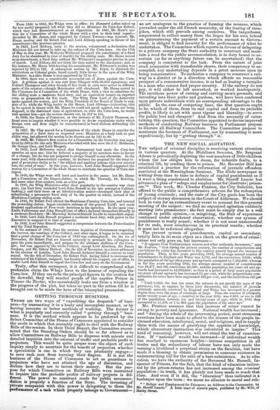GETTING THROUGH BUSINESS.
THERE are two ways of "expediting the despatch" of busi- ness—by transacting it in a hasty and incomplete manner, or by having recourse to better methods of working. The former is what is popularly and correctly called "getting through" busi- ness. It is the method which appears to be preferred by the Select Committee of the House of Commons appointed to consider the mode in which that assembly ought to deal with the Railway Bills of the session. In their Third Report, the Committee recom- mend that the Standing Orders should be so far altered as to allow Committees on Railway Bills to dispense with minute and detailed inquiries into the amount of traffic and probable profit to projectors. This would be quite proper were the object of such inquiry simply to ascertain for the benefit of projectors whether
speculation is one in which they can prudently engage— to save rash men from burning their fingers. It is not the -business of the House of Commons to act as guardians to projectors who have not attained the age of discretion, and dictate how they are to invest their money. But the pur- pose for which Committees on Railway Bills were instructed to inquire into the probable profits of railway projects is dif- ferent. The power to construct roads for public accommo- dation is properly a function of the State. The investing of private companies with this power is delegating to them the performance of a task which properly belongs to Government— an act analogous to the practice of farming the revenue, which prevailed under the old French monarchy, or the leasing of turn- pikes, which still prevails among ourselves. The taxgatherer, empowered to collect money from the lieges for his own behoof on guaranteein,T the payment of a certain amount to Govern- ment, is obliged to find security for the performance of what he undertakes. The Committee which reports in favour of delegating to a private company the State authority to construct and main- tain a road for the public accommodation, is in duty bound to as- certain (as far as anything future can be ascertained) that the company is competent to the task. From the nature of joint stock companies with transferable shares, their competency to ac- complish any undertaking depends in a great measure upon its being remunerative. To authorize a company to construct a rail- way in a district or in a direction which affords no reasonable prospect of a remunerative income, is as bad as leasing a turnpike to a man who cannot find proper security. If the railway do not pay, it will either be left unworked, or worked inadequately-. The invidious power of cutting and carving men's grounds, and intruding into their parks and gardens, will have been conferred upon private individuals with no corresponding advantage to the public. In the case of competing lines, the first question ought to be, which of them, from its real capital and from its probable profits, is likely to act with most vigour and liberality—to serve the public best and cheapest? And from the necessity of enter- taining this question, the Committee appointed to devise improved methods of conducting Railway business in Parliament propose to liberate all Railway Committees. The Committee propose to accelerate the business of Parliament, not by transacting it more expeditiously, but by "getting through" it.


























 Previous page
Previous page